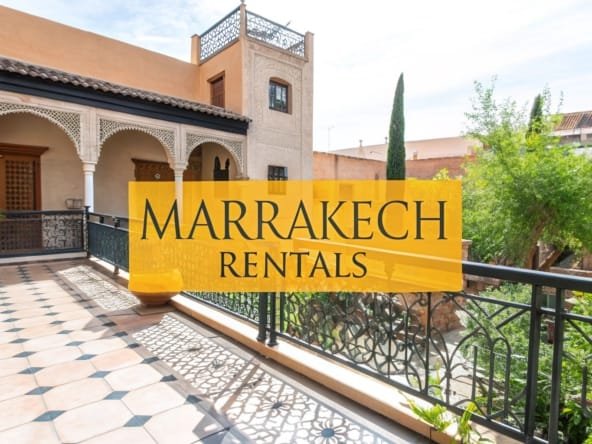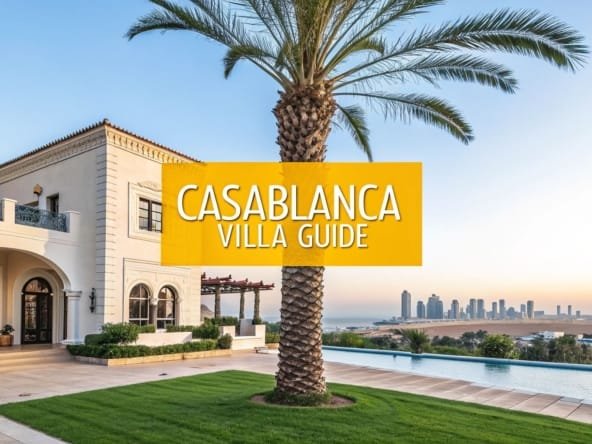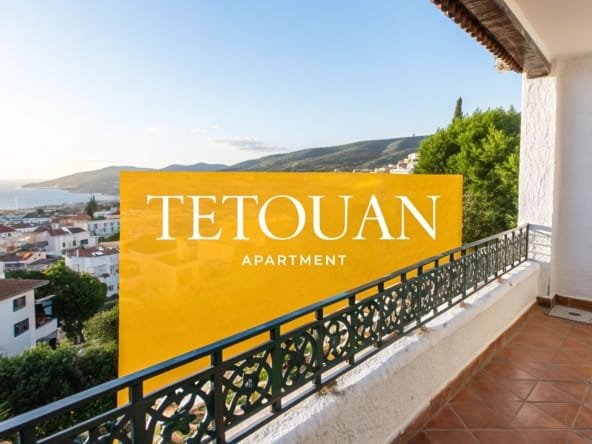Before you even start typing "apartment for sale in Agadir" into a search bar, it's crucial to get a real feel for the city's property landscape. Agadir isn't just one big market; it's a tapestry of different neighbourhoods, each with its own rhythm and investment profile. Knowing the difference between a high-energy holiday hotspot and a quiet residential pocket is the first, and most important, step to making a smart purchase.
Getting to Grips with the Agadir Property Market
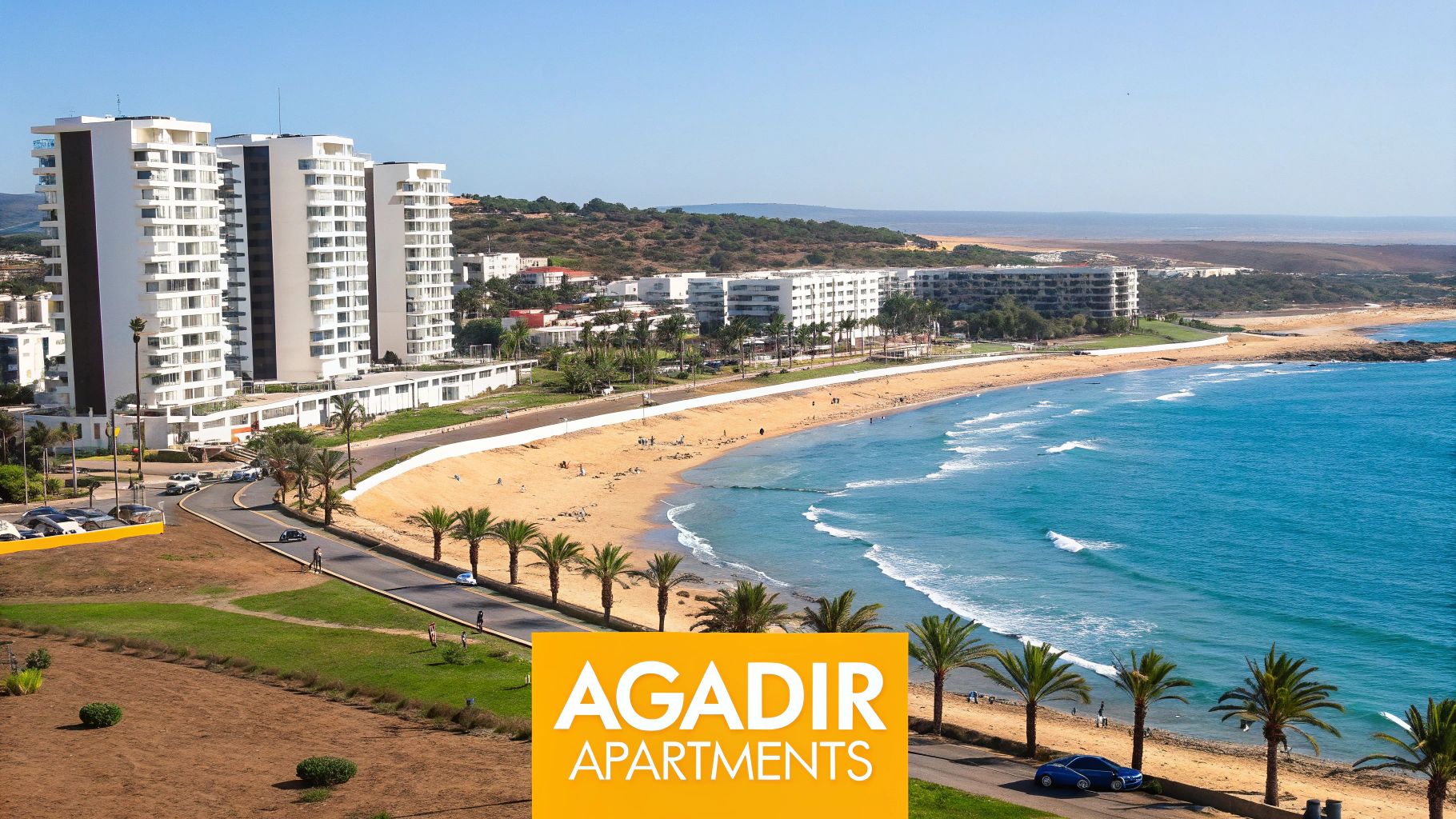
The charm of Agadir’s real estate market lies in its dual personality. On one hand, it's a world-class tourist destination, and on the other, it's a genuinely vibrant Moroccan city. This split is mirrored directly in the kinds of properties you'll find.
For example, the Tourist Zone (Zone Touristique) is packed with modern flats built almost exclusively for the holiday rental market. Here, it’s all about location. Proximity to the beach, the best restaurants, and the nightlife is what dictates value. Buying here isn't just buying a flat; it’s investing in Agadir's booming tourism industry, which can mean fantastic rental income, particularly during the high season.
Different Neighbourhoods, Different Goals
Head over to areas like Hay Mohammadi or Dakhla, and the entire atmosphere changes. These are the neighbourhoods where local families live, offering a much more authentic Moroccan experience. You’ll find larger apartments at more reasonable prices, with everyday life revolving around local souks, schools, and community centres. A property here is less about chasing seasonal tourist money and more about embracing a local lifestyle or securing a long-term residential investment.
So, the big question is: what do you actually want from your property?
- Looking for high rental returns? Your best bet is to focus on the Tourist Zone, Founty, or near the Marina where holidaymakers flock.
- Searching for a permanent home? Explore Hay Mohammadi, Talborjt, or Iligh. You'll find a quieter pace of life and more space for your money.
- Want the best of both worlds? Check out areas like Cité Suisse. It strikes a great balance between residential peace and easy access to tourist attractions.
It's worth noting that after a period of significant growth, the market is currently in a "cooling off" phase. For a well-prepared buyer, this could be a golden opportunity.
Recent figures from early 2024 show a slight shift. Residential property prices in Agadir dipped nominally by 1.4%, and when you factor in inflation, the real drop is closer to 2.3%. This, combined with a nationwide slowdown in property sales, hints that we're moving into a buyer's market.
This isn't a sign of a crash, but rather a healthy market stabilisation. For you, this means less frantic competition and more room to negotiate a favourable deal. A great way to get a real-time feel for what's out there is to browse through current listings for Agadir property for sale to see how prices and availability stack up across these different neighbourhoods.
Creating Your Agadir Property Wishlist
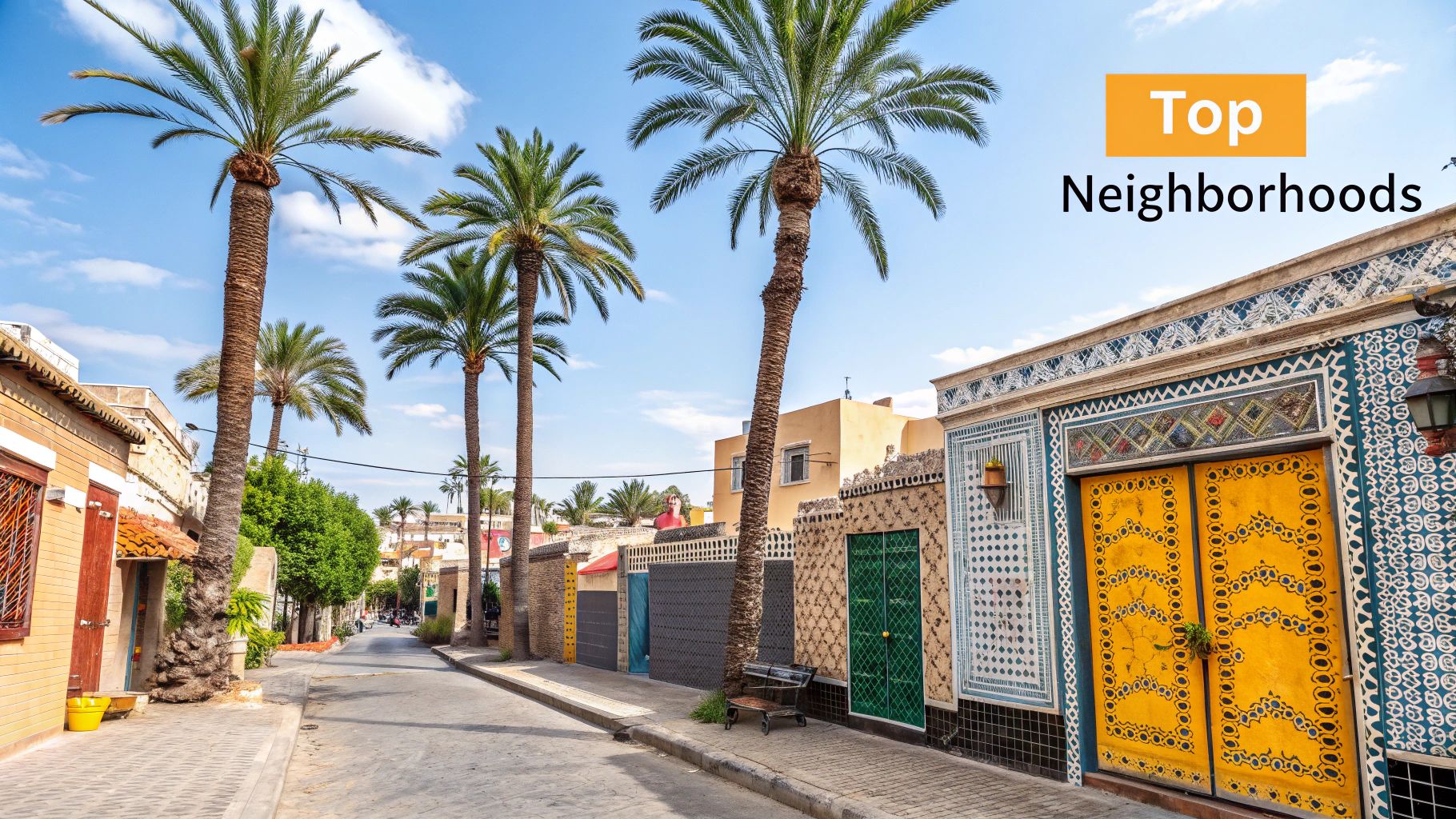
Before you start scrolling through listings, the single most valuable thing you can do is create a detailed brief for your property search. Think of it as your roadmap. It turns a potentially overwhelming hunt into a focused, targeted mission, saving you countless hours visiting apartments that just aren't the right fit.
This is about much more than just the number of bedrooms. You need to get to the heart of why you're looking for an Agadir Maroc appartement vendre. Is this going to be a holiday home that needs to earn its keep through rentals? Or is it a full-time residence for your family? Your answer changes everything.
A holiday let, for instance, practically demands a sea view and easy access to the Marina to attract bookings. A permanent family home, on the other hand, might prioritise being close to good schools, parks, and local souks for daily life.
Defining Your Lifestyle Needs
Next, try to picture yourself actually living in Agadir. What does your day-to-day look like?
A sleek, modern new-build with a shared pool offers that "lock-up-and-leave" convenience perfect for a holiday flat. But if you're after something with more soul, a traditional apartment in a neighbourhood like Talborjt could provide more space, authentic character, and a genuine connection to the local community.
To really narrow things down, ask yourself some practical questions:
- Access & Location: Is secure parking a dealbreaker? Does it have to be within walking distance of the beach, or would you prefer the quiet of a residential area set back from the coast?
- Building Amenities: Is a lift essential (especially in older buildings)? Are you looking for a complex with on-site security, a gym, or maybe some communal gardens?
- Future Use: Will you need a dedicated space for a home office? Is having an extra room for when family comes to visit a priority?
Your wishlist is your filter. When you give your agent a clear set of criteria, they can immediately discard unsuitable options and show you only the properties that are serious contenders.
Balancing Wants and Needs
The final, crucial step is to separate your "must-haves" from your "nice-to-haves." This is where you prepare yourself to make smart compromises when the time comes.
For example, that panoramic sea view is a dream feature, no doubt. But would you be willing to trade it for an extra bathroom or a much larger kitchen if an apartment ticked every other box? Being honest about these potential trade-offs from the start will make your final decision so much easier.
Your goal is to build a focused brief that covers the absolute essentials but still leaves a little room for a property to surprise you. This clarity is what makes a property search in Agadir not just successful, but efficient and enjoyable.
Navigating the Moroccan Purchase Process
So, you’ve found an apartment in Agadir that ticks all the boxes. That’s the exciting part done. Now comes the structured, legal process of making it yours. Buying property in Morocco is a well-defined journey, designed to protect both you and the seller. It’s less about a quick handshake and more about methodical, legally sound steps.
At the heart of every transaction is the ‘notaire’ (notary). Unlike in some countries where solicitors represent each side, the notaire is a state-appointed legal professional who acts as a neutral third party. Their job is to oversee the entire process, verify every document, draft the contracts, and ensure the final transfer of ownership is airtight and legally binding.
This infographic breaks down the key phases you'll go through, from searching for your ideal property to the final handover.
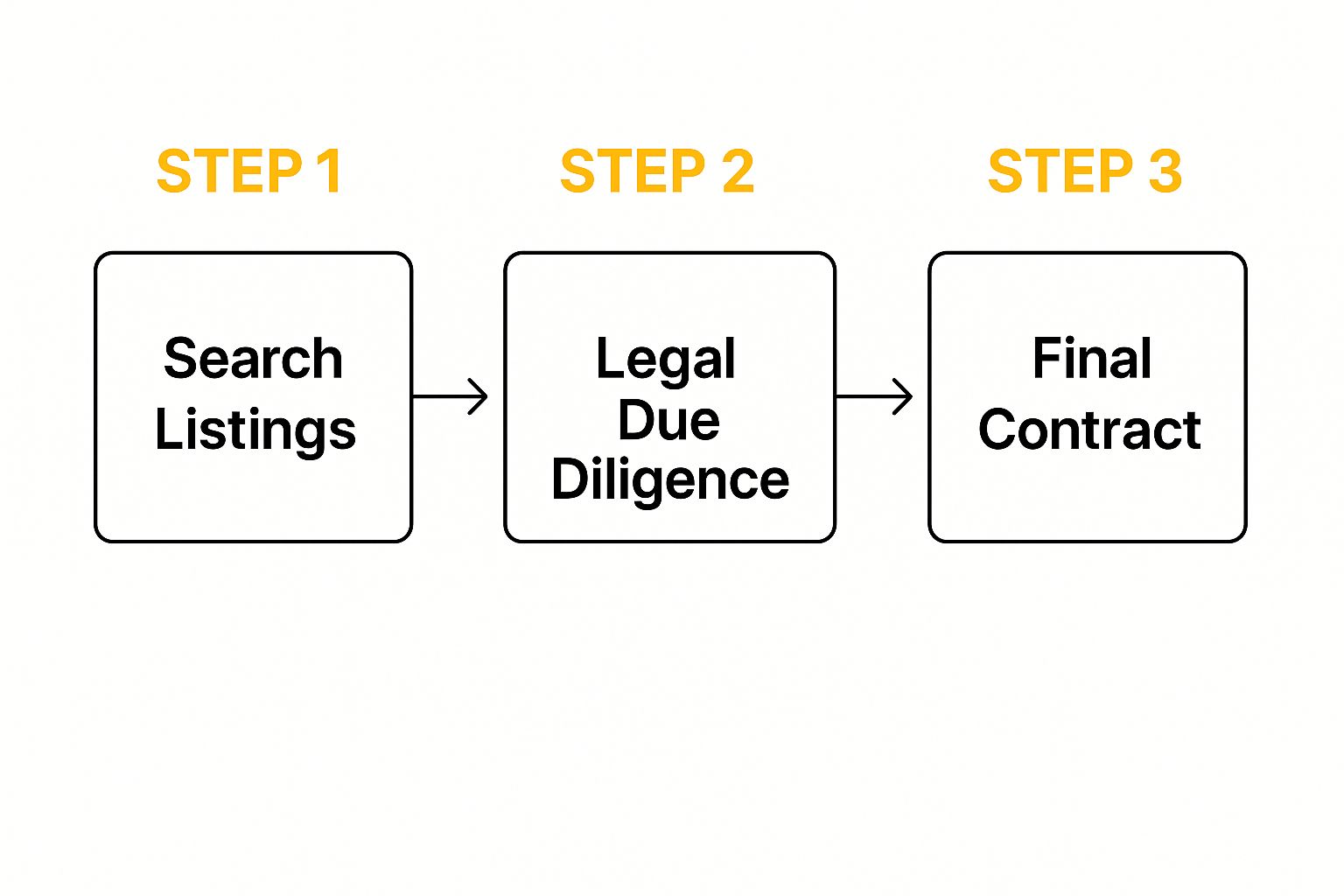
As you can see, the path moves from an initial search into a crucial due diligence phase. This is where the real checks happen, protecting your investment before any final contract is even considered.
Making an Offer and the Preliminary Contract
Once your verbal offer has been accepted, it’s time to make things official by signing the ‘compromis de vente’ (preliminary sales agreement). Don't mistake this for a simple reservation form; it's a serious, legally binding contract that lays out the entire framework for the sale.
Inside this document, you'll find all the critical details:
- A complete description of the apartment.
- The final agreed-upon sale price.
- The payment schedule, including your deposit.
- Any ‘clauses suspensives’—these are conditional clauses, such as the sale being dependent on you securing a mortgage.
This is also when you'll pay a deposit, which is almost always 10% of the purchase price. The notaire holds this money in a secure escrow account. It shows you're a committed buyer and effectively takes the property off the market while all the legal groundwork is completed.
The ‘compromis de vente’ is a two-way street. If you, as the buyer, decide to walk away for a reason not covered by the conditional clauses, you’ll almost certainly lose your deposit. On the other hand, if the seller pulls out, they must typically return your deposit and pay you a penalty of the same amount.
The Importance of Due Diligence
This is where the notaire truly earns their fee. They conduct exhaustive due diligence, a non-negotiable step that protects you from any future surprises. Their main focus is the ‘titre foncier’ (title deed), which they scrutinise to confirm several vital points:
- Clear Ownership: They verify that the seller is the one and only legal owner. No disputes, no complications.
- No Encumbrances: The notaire performs a deep check for any outstanding mortgages, liens, or legal claims against the property.
- Property Conformity: They ensure that what’s on the deed—the size, boundaries, and specifications—perfectly matches the physical apartment you’re buying.
This process is your ultimate safeguard. It guarantees you receive a clean title, free from anyone else’s debts or legal baggage. It's the most critical part of securing your Agadir Maroc appartement vendre. To get a better handle on the costs involved, you can learn more about the notary fees in Morocco, as this work is covered within their fee structure.
To help you visualise the entire journey, here's a breakdown of the typical stages involved in a Moroccan property purchase.
Key Stages of the Moroccan Property Purchase Process
This table summarises the essential steps, the documents you'll encounter, and the key professionals who will guide you through buying your apartment in Agadir.
| Stage | Key Action | Primary Document | Involved Professional |
|---|---|---|---|
| Initial Offer | Verbally agree on a price with the seller. | (None – Verbal) | Real Estate Agent |
| Preliminary Contract | Sign the agreement and pay the 10% deposit. | Compromis de Vente | Notaire, Buyer, Seller |
| Due Diligence | Notaire verifies title deed and legal status. | Titre Foncier | Notaire |
| Final Contract | Sign the final deed and pay the remaining balance. | Acte de Vente | Notaire, Buyer, Seller |
| Registration | Notaire registers the sale with the Land Registry. | New Titre Foncier | Notaire, Land Registry |
Each stage builds upon the last, creating a secure and transparent process that ensures your investment is protected from start to finish.
The Final Act and Transfer of Ownership
With all the legal checks cleared and any conditions (like mortgage approval) met, you’re on the home stretch. The final step is signing the ‘acte de vente’, the final deed of sale.
Everyone meets at the notaire’s office for the signing. This is when you'll transfer the remaining balance of the purchase price. From there, the notaire handles the last piece of the puzzle: registering the new deed with the Land Registry (Agence Nationale de la Conservation Foncière).
Once the registration is complete, the property is officially in your name. You’ll receive the keys and your own original title deed, marking the successful end of your property journey. Congratulations, you're now an owner
Getting Your Finances in Order for an Agadir Apartment
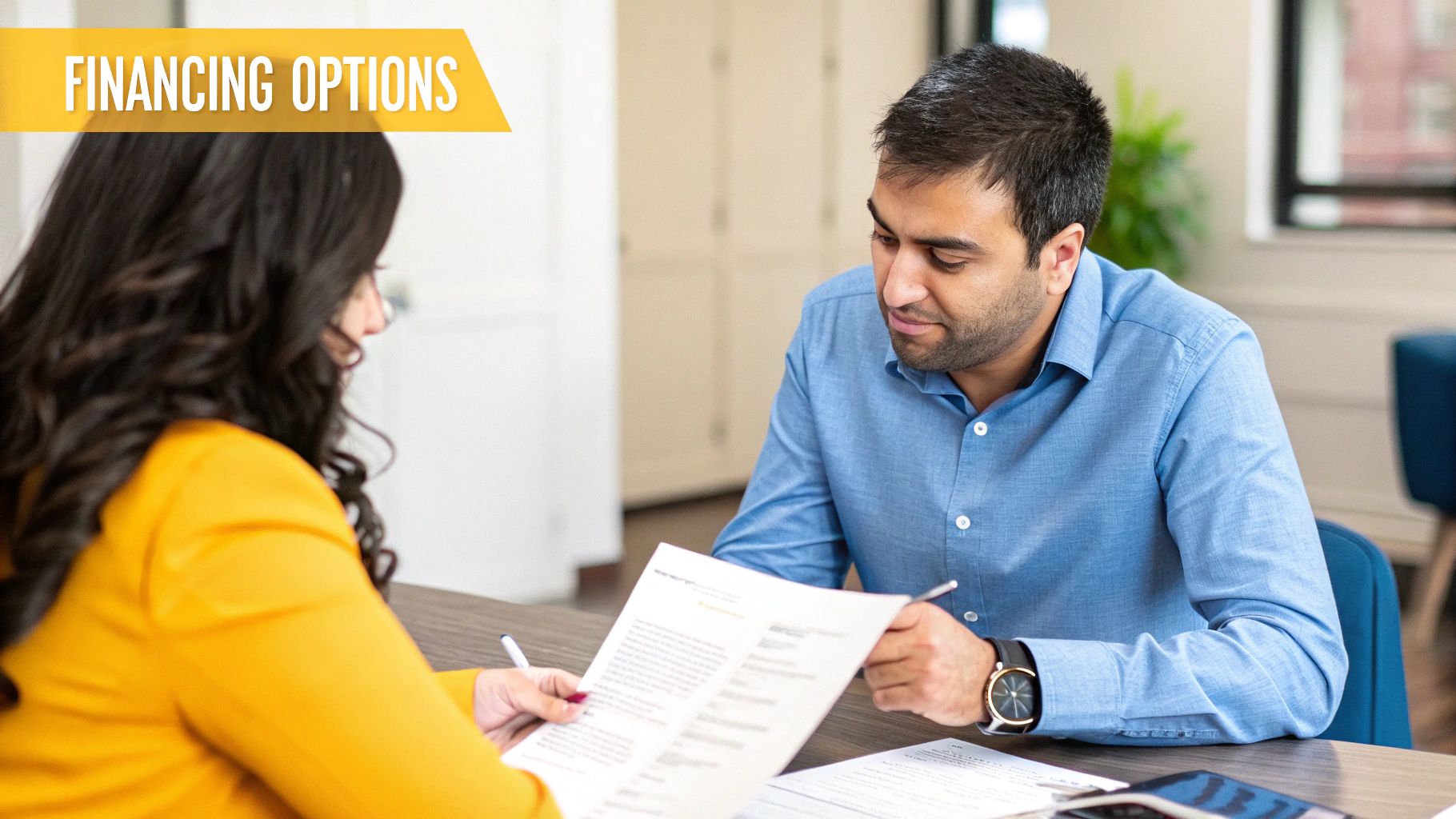
This is where the dream starts to become a reality. Securing your financing is a huge step when looking at any Agadir Maroc appartement vendre. Whether you're a local or buying from abroad, figuring out the money side of things early on will save you a lot of headaches later.
The great news? Moroccan banks are generally quite welcoming to property buyers, including non-residents.
The journey usually starts with getting a pre-approval for a loan, which gives you a solid budget and shows sellers you mean business. You'll typically need to put down a deposit, which can be anywhere from 20% to 40% of the apartment's price. The exact amount often depends on whether you're a resident and your overall financial situation. Having your paperwork ready to go will make everything move much faster.
How to Apply for a Moroccan Mortgage
When you sit down with a Moroccan bank, their main goal is to understand your ability to handle the loan repayments. It pays to be organised.
You’ll need to assemble a file with a few key documents:
- ID: Your passport or Moroccan national ID card (Carte Nationale d'Identité).
- Proof of Income: Recent payslips are standard, but an employment contract or tax returns from the last few years also work.
- Bank Statements: Most banks ask for the last three to six months' worth of statements to see a stable financial history.
- The Preliminary Sales Agreement: This is the signed compromis de vente for the specific property you want to buy.
My advice? Get pre-approved before you even start seriously hunting for a property. It's a game-changer. It shows sellers you're a credible buyer and gives you incredible confidence when negotiating because you know precisely what you can afford.
Funding Advice for International Buyers
If you're buying from outside Morocco, your first and most critical step is managing the money transfer. You are required to open a convertible Moroccan dirham (MAD) bank account.
This isn't just a regular account. It's designed specifically to allow you to bring in foreign currency, convert it to dirhams for the purchase, and—importantly—take your money back out of Morocco if you sell down the line.
This process is strictly regulated by Morocco's foreign exchange authority, the Office des Changes. Keep meticulous records of every single wire transfer into this account. You'll need this paper trail when it's time to finalise the purchase.
The broader economic picture is also encouraging. Morocco's residential market is on a solid growth trajectory, driven by stability and increasing urbanisation. In fact, projections see the market hitting a valuation of US$1.53 trillion by 2025, with an expected annual growth rate of about 4.86% through 2029. This positive forecast makes financing an apartment in Agadir an even more solid investment. You can dig into more data on Morocco's thriving real estate market on inafrika.co.tz.
Don't Forget the Closing Costs
The price you agree on with the seller isn't the final number you'll pay. It’s crucial to budget for the extra costs involved in closing the deal. These are standard in Morocco and are paid when you sign the final deed.
Here’s a quick rundown of what to expect:
- Notary Fees: Around 1% of the property’s value.
- Registration & Land Registry Fees: These combined can range from 4% to 6%.
- Agency Fees: If you worked with a real estate agent, their commission is typically 2-5%.
These fees can easily add another 10% on top of the purchase price, so factoring them into your budget from the start will ensure there are no unwelcome financial surprises on closing day.
Unlocking Your Property's Investment Potential
Your new apartment in Agadir can be much more than just a sun-drenched holiday spot; it can be a smart, income-generating asset. The trick is to understand the local rental market. With the right strategy, you can turn your property into a solid source of income, whether you live just around the corner or halfway across the world.
Thanks to Agadir's booming tourism scene, the short-term holiday let market is an incredibly attractive option. While the city draws visitors all year, demand really spikes during the European summer holidays and the winter sun season. If you can align your pricing with these peak times—think Christmas, New Year, and Easter—you can seriously maximise your returns.
Short-Term Lets Versus Long-Term Rentals
So, which path do you take? The choice between short-term and long-term renting really boils down to your personal goals and just how involved you want to be.
-
Short-Term Holiday Lets: This route offers the potential for much higher nightly rates, which can lead to a bigger overall income. It also gives you the fantastic flexibility to block out dates for your own holidays. The trade-off? It’s a lot more work. You’ll be handling constant bookings, guest communication, and arranging cleaning between every single stay.
-
Long-Term Residential Rentals: This is your set-it-and-forget-it option. You find a reliable tenant, sign a contract (usually for a year), and you get a steady, predictable income each month. While the total annual earnings might not reach the highs of a successful holiday let, you get simplicity and peace of mind in return.
Looking at the numbers, Agadir's short-term rental market has some serious potential. Between mid-2024 and mid-2025, for example, the average Airbnb occupancy rate was around 50%. That’s about 182 booked nights a year. With an average daily rate of MAD 516 (about $51), you could be looking at an annual revenue of roughly MAD 90,000. You can find more data on Agadir's Airbnb revenue potential on airbtics.com. This kind of information is gold when trying to forecast what your Agadir Maroc appartement vendre could actually earn.
Choosing the right rental strategy is all about balancing the potential income against the time and effort you're willing to put in. There's no single "best" answer, only what's best for you.
Property Management for Absentee Owners
But what if you live abroad? The thought of managing a rental from another country can feel overwhelming, but it’s completely doable if you have the right team on the ground. Finding a trustworthy local property management company is the most critical step you'll take.
A good management company essentially becomes your local partner, handling all the legwork:
- Marketing your apartment and managing all bookings
- Screening potential tenants or holiday guests
- Coordinating all check-ins and check-outs
- Dealing with maintenance issues and any emergency repairs
- Making sure the property is spotless for every new arrival
Hiring a professional service like this transforms your investment into a truly passive income stream. It gives you the confidence that your property is not only profitable but also well-cared for. Before you sign anything, always ask for references and get a crystal-clear breakdown of their fees, which are typically a percentage of the rental income. Knowing these costs is a crucial part of the puzzle as you work out the potential rental yield for your apartment.
Common Questions About Buying in Agadir
Diving into the Agadir property market, especially from afar, naturally stirs up a few questions. It’s completely normal. Most people considering an Agadir Maroc appartement vendre tend to ask about the same things: legal rights, running costs, and how to actually navigate the search.
Getting straight answers to these common queries is the best way to build the confidence you need to take the next step. So, let’s tackle the questions we hear most often from our clients.
Can Foreigners Actually Own Property in Agadir?
This is usually the first thing people ask, and the answer is a clear and simple yes. Moroccan law is incredibly welcoming to foreign buyers.
As a non-resident, you can purchase and hold the freehold title—known locally as a ‘titre foncier’—to apartments and other properties within designated residential areas. This gives you the exact same ownership rights as a Moroccan citizen would have for that property.
The only real restriction is on agricultural land, but if you’re looking for an apartment in the city, this won’t affect you at all. The system is secure, well-established, and designed to protect your investment.
What Are the Typical Annual Costs of Owning an Apartment?
Once you’ve bought the place, what are the ongoing expenses? It’s a smart question to ask. Beyond the purchase price, you’ll need to budget for annual costs, which are generally quite reasonable in Agadir.
Here’s a quick breakdown of what to expect:
- Taxe d'Habitation (Housing Tax): This is an annual local tax paid by whoever lives in the property, whether that’s you or a tenant.
- Taxe de Services Communaux (Municipal Services Tax): This one covers things like rubbish collection and street lighting for the neighbourhood.
- Syndic Fees (Building Management): If your apartment is in a complex with shared spaces—like a lift, a swimming pool, or gardens—you'll contribute to their upkeep. This is paid to the ‘syndic’ (the building’s management association), usually monthly or quarterly.
These costs will naturally vary depending on the apartment's size and the neighbourhood, but they're a standard part of the deal.
A reliable estate agent should be able to give you a solid estimate of these annual costs for any specific property you're looking at. This kind of transparency is key to understanding the full financial picture.
Do I Really Need a Real Estate Agent?
You could try to go it alone, scrolling through online listings. But honestly, working with a reputable local agent brings a level of insight and security that’s hard to replicate, particularly if you’re not based in Morocco.
A good agent is so much more than just a key-holder. They bring deep local knowledge to the table, helping you understand the subtle differences between neighbourhoods and what a fair market price actually looks like. They’ll also be your bridge to other trusted professionals, from notaries to lawyers, making the whole process run smoothly.
Think of them as your advocate on the ground. They handle the negotiations, look out for your best interests, and guide you through a process that can otherwise feel pretty overwhelming.
At Rich Lion Properties, we provide the expert guidance you need to navigate every step of your property journey in Morocco with confidence. Explore our services and find your ideal property today.

